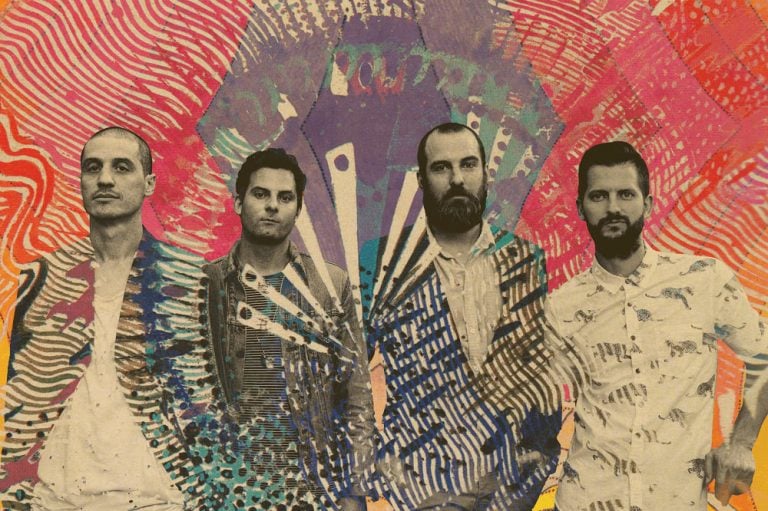Ask any band what their thoughts are about their newest record, and you can take it for granted that they’ll murmur some vague, self-congratulatory yet humbled statement – something like, “Well, we love it, but we can’t wait to see what the fans think.”
It’s par for the course, not only because vague questions get vague answers in both music interviews and, yer know, regular conversation, but because bands usually are proud of their latest release – or at least, tied financially to it enough that they have to pretend to be.
But when Mutemath’s lead vocalist Paul Meany gets posed a warm-up question about his new record, Play Dead, he doesn’t dismiss the question, or blurt out an answer. He thinks, for what feels like an impossibly long time and then finally says, his voice hushed: “We’re really proud of this one.”
“I think between all these experiments from album to album, it was becoming evident to us what we liked playing best.”
It’s not hard to see why, either. Mutemath have been going at it for 15 years now, releasing bold, psych, prog and avant-garde indebted records and amassing a small army of followers along the way. But Play Dead, more than any record they have released since their self-titled debut, feels like an uncompromised mission statement; as pure a work as they have ever released.
That wasn’t an accident either – Meany and his compatriots actively worked to simplify their sound, and they tried hard not to experiment just for the sake of experimenting. “I think the first record certainly set the experimental tone,” Meany says, his voice thick and low. “I think we had always wanted to just try stuff. I don’t know if that’s just an indulgent trap that artists can fall into – we certainly fell into it. It was like, ‘Oh, this is our second record? Let’s throw in horns and string sections and not use the instruments that we used on the prior record.’
“I think all that yielded some fun. But I think between all these experiments from album to album, it was becoming evident to us as we were playing our shows and trimming down what we could play in our 90-minute set, what we enjoyed most, and what we liked playing best.”
Certainly the key to Play Dead is an unfettered sense of fun – which maybe sounds paradoxical, given the record’s morbid title, and Mutemath’s reputation as stony faced prophets. But in each of the record’s sun-blasted guitar licks, you can hear how much they are bloody enjoying themselves; you can feel, rippling off the record like heat waves off tarmac on a sunny day, a pure, unabashed sense of gleeful abandon.
“We tried to let each guy kind of follow their bliss with a song that they thought really connected to them.”
“This is the first album that we did where we had no outside collaborators,” Meany says. “It was just the four of us doing all the writing, all the recording, all the mixing… The whole thing. We just approached this record as four producers coming in to produce a really good Mutemath album, and trying to figure out what that sounded like. And I think we worked out that it was very exciting for us; we enjoyed it. We paid attention to what we’ve experienced in our shows, and we really tried to funnel that into getting the best performances out of each of us.”
He thinks for a moment. “I mean, I reckon this record was about discovering what it sounds like when our band is firing on all cylinders. It was about finding out what we do best as a band – about really unleashing. It wasn’t so much about what we might be listening to – like, the songs we have on our playlists and our iPhones and wanna try on this record. It was much more about self-producing it.”
Some of the material on the record is five years old, adding the strange weight of legacy to the project. But despite that selfsame vague, reflective quality of Play Dead, it never becomes a work of history, or the result of some mad bout of archiving; it has blood, and vim, and vigour.
“We had 30 demos that we brought with us to the writing session. Some of them old – there are songs on this record that date back to 2012 – and as we were listening to them, we didn’t agree on which songs we wanted on this album. And that was fine. All we did for each other was say, ‘Hey, you pick the three or four songs that you are most proud of out of these 30.’ And coincidentally, each one of us picked different ones.”
“So we took time to push them along; to rearrange them; to get the performances out of each other that we needed. And we shaped them into songs, and we enabled each other to step up as producers and arrangers. And that kinda took the pressure off democratically trying to work out if we all liked the song before we poured into it. We tried to let each guy kind of follow their bliss with a song that they thought really connected to them.”
The result is the prototypical Mutemath record; a strange, beautiful album that might be the very best of their entire career. “I feel like in some strange way, this is the record that we’ve been working towards all along,” Meany laughs. “It’s like we were trying to follow up our very first album.”
Play Dead is out Friday September 8 through Caroline / Spunk.


































